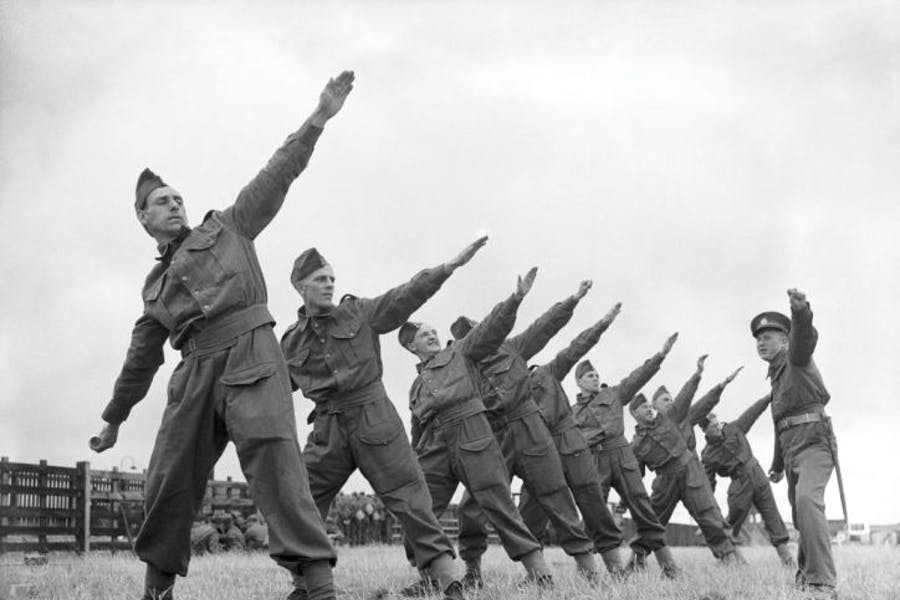“Do not waste a single vertebra,” says Major General Paul Nanson CBE, in Stand Up Straight, his book of life lessons from the Royal Military Academy Sandhurst, where he serves as Commandant. With a career in the British Army spanning more than 30 years, Nanson is no patchouli-scented shaman. His Sandhurst hacks have seen him through The Troubles, the Gulf War, the Bosnian War, the Iraq War, and the war in Afghanistan. So I reckon he’s reasonably well qualified to dish out advice.
“I’m a great believer in healthy body, healthy mind. If you’re physically fit, you’ll be more mentally fit,” says Nanson, who takes his morning run as an opportunity to reflect. On Nanson’s watch, a run is not just shuffling round the park resisting the urge to buy an ice-cream. It is Command Time.
“Getting off the computer and out of the office gives you the time and space to think and consider your own life, and the decisions you’re about to make,” says Nanson, who tells me he wouldn’t be without his daily physical.
I like the concept of Command Time, and the potential for using it to validate any absence from my desk. “I’m taking Command Time!” sounds so much more, well, commanding than muttering, “I’m just nipping out,” so I’m pleased to hear Nanson has more of these appellations up his well-ironed sleeve.
“I think the army’s renowned for having its own language,” says Nanson, who also advocates taking a “Condor Moment”. The term originates from ads for Condor tobacco, in which a suave pipe smoker swiftly sees off any form of nuisance. “Nothing should disturb that Condor moment,” says the voiceover, providing chaps everywhere with an excellent euphemism.
“When you’re explaining to recruits that they need to take time to consider their next action, if you’re very scientific about it, you probably won’t resonate with them. But if you talk about the pipe smoker, it gets into their psyche and it sticks. So when you say to them, ‘just take a Condor Moment,’ they get it,” explains Nanson.
But these techniques aren’t just for British Army officers. “What we learn at Sandhurst absolutely translates into the civilian world. We can take those lessons and apply them to a civilian environment,” declares Nanson. Here’s how to apply some military discipline to your work life:
On the commute
If someone whacks you with their rucksack or spills their coffee on you, the worst thing you can do is react angrily. Take a deep breath, and take a Condor Moment. Put your music on, or get back into your Kindle, and just grit it out. There’s no point in getting angry or pushing – it’s wasted effort and it’s not going to get you anywhere.
Before an interview
If you’ve got the time, recce the route. We’ll meticulously rehearse an operation until we’re sick to death of it in the military and no detail is too small to master in advance. Rehearsal is everything: think about the worst possible questions they might ask in the interview and get a friend to test you, so you’re prepared for anything.
At work
If something’s gone wrong for you, sliding under your duvet to sulk is the worst thing you can do. Take an After Action Review while it’s still fresh in your mind, to go through what went wrong, where it could have gone better, and if the same thing happens again, how you would do it better. It’s important to not take it as a failure – it’s an opportunity to do better next time.
In a meeting
Research shows that people with good posture make a better impression than those who slouch. We talk about having Command Presence, which means that if you look the part, and you’re confident, your soldiers will believe in you, even though you’re telling them something they may not want to hear. A lot of what we do, whether it’s in the military or in the civilian world, is like being an actor – you’ve got to play a part and people have got to believe in you. Holding yourself well is an important part of daily life.
Out of Office
I’m a strong believer that Command Time is important for everybody, not just those in charge, so if you’re responsible for an organisation, or a team of people, make this part of the culture. Make it a habit that you don’t send emails after 6pm, and get out of the office every lunchtime, to go for a walk or go to the gym. If the boss is doing it then other people will follow their example and they won’t feel bad about it.
Samantha Rea can be found tweeting here






Comments